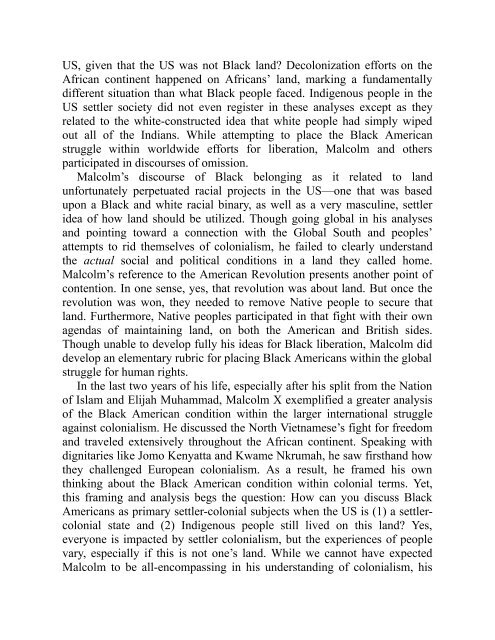Create successful ePaper yourself
Turn your PDF publications into a flip-book with our unique Google optimized e-Paper software.
US, given that <strong>the</strong> US was not Black land? Decolonization efforts on <strong>the</strong><br />
African continent happened on Africans’ land, marking a fundamentally<br />
different situation than what Black people faced. <strong>Indigenous</strong> people in <strong>the</strong><br />
US settler society did not even register in <strong>the</strong>se analyses except as <strong>the</strong>y<br />
related to <strong>the</strong> white-constructed idea that white people had simply wiped<br />
out all <strong>of</strong> <strong>the</strong> Indians. While attempting to place <strong>the</strong> Black American<br />
struggle within worldwide efforts for liberation, Malcolm and o<strong>the</strong>rs<br />
participated in discourses <strong>of</strong> omission.<br />
Malcolm’s discourse <strong>of</strong> Black belonging as it related to land<br />
unfortunately perpetuated racial projects in <strong>the</strong> US—one that was based<br />
upon a Black and white racial binary, as well as a very masculine, settler<br />
idea <strong>of</strong> how land should be utilized. Though going global in his analyses<br />
and pointing toward a connection with <strong>the</strong> Global South and peoples’<br />
attempts to rid <strong>the</strong>mselves <strong>of</strong> colonialism, he failed to clearly understand<br />
<strong>the</strong> actual social and political conditions in a land <strong>the</strong>y called home.<br />
Malcolm’s reference to <strong>the</strong> American Revolution presents ano<strong>the</strong>r point <strong>of</strong><br />
contention. In one sense, yes, that revolution was about land. But once <strong>the</strong><br />
revolution was won, <strong>the</strong>y needed to remove Native people to secure that<br />
land. Fur<strong>the</strong>rmore, Native peoples participated in that fight with <strong>the</strong>ir own<br />
agendas <strong>of</strong> maintaining land, on both <strong>the</strong> American and British sides.<br />
Though unable to develop fully his ideas for Black liberation, Malcolm did<br />
develop an elementary rubric for placing Black Americans within <strong>the</strong> global<br />
struggle for human rights.<br />
In <strong>the</strong> last two years <strong>of</strong> his life, especially after his split from <strong>the</strong> Nation<br />
<strong>of</strong> Islam and Elijah Muhammad, Malcolm X exemplified a greater analysis<br />
<strong>of</strong> <strong>the</strong> Black American condition within <strong>the</strong> larger international struggle<br />
against colonialism. He discussed <strong>the</strong> North Vietnamese’s fight for freedom<br />
and traveled extensively throughout <strong>the</strong> African continent. Speaking with<br />
dignitaries like Jomo Kenyatta and Kwame Nkrumah, he saw firsthand how<br />
<strong>the</strong>y challenged European colonialism. As a result, he framed his own<br />
thinking about <strong>the</strong> Black American condition within colonial terms. Yet,<br />
this framing and analysis begs <strong>the</strong> question: How can you discuss Black<br />
Americans as primary settler-colonial subjects when <strong>the</strong> US is (1) a settlercolonial<br />
state and (2) <strong>Indigenous</strong> people still lived on this land? Yes,<br />
everyone is impacted by settler colonialism, but <strong>the</strong> experiences <strong>of</strong> people<br />
vary, especially if this is not one’s land. While we cannot have expected<br />
Malcolm to be all-encompassing in his understanding <strong>of</strong> colonialism, his


















